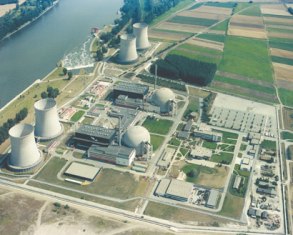The German Ministry of Finance has envisaged an additional €2.3 billion ($2.8 billion) per year 'windfall tax' on nuclear operators as part of the 2011 Federal Budget and its financial plan up to 2014.
 |
| RWE has had to juggle generation rights for a chance to operate Biblis A under a new political regime |
According to the German Finance Ministry the charge "will be necessary, as part of an overall energy concept, to prolong the operational life of nuclear power plants." At a time when Germany is looking for tens of billions of euros in budget savings, the ministry said that the money will be used to meet nuclear decommissioning and final repository costs.
German nuclear power plants are currently limited by a set of generation quotas that effectively limit reactor lives to an average of 34 years, compared to a economic life of up to 60 years. This has been under review since the general election of September 2009 resulted in a coalition government free from anti-nuclear parties. In the meantime, German nuclear utilities like EOn and RWE have been looking at opportunities to invest in new nuclear reactors elsewhere in Europe such as Bulgaria, Finland, Italy and the UK, where they founded the Horizon joint venture to build up to 6000 MWe in new capacity.
The German government has concluded that changes to the phase-out, dubbed 'life extension', will require the nuclear operators to 'share' a relatively large proportion of the additional earnings derived from nuclear life extensions. The potential €2.3 billion nuclear tax is thus not being linked to changing the phase-out but positioned instead as a tax on nuclear fuel and therefore an additional cost for the nuclear operators to bear.
Give and take
While nuclear faces fees to reduce its competitiveness, other forms of energy are subsidised. German coal production has been supported since the 1980s by between €2.5 billion and €7.9 billion per year while renewables receive feed-in tarrifs amounting to €5 billion per year from consumers and government. |
Neil Beddall, an analyst at Barclays Capital said that he considers this step as negative for the industry, adding that EOn and RWE are likely to be affected the most.
"Having in mind that these companies reported financial results for the year of 2009 of, respectively, €9.2 billion and €8.6 billion, I do not believe that the tax will reduce the credit quality of any of the German nuclear operators, including EnBW and Vattenfall Europe," Beddall said.
However, the new plan is likely to have an impact on free cash flow in the industry, at a time when it is not clear whether austerity measures introduced across Europe, led by Germany and France, would have an impact on the economic recovery and respectively on energy demand for 2010 and 2011.
Furthermore, if the plan is approved, other countries could adopt similar measures on all utilities, or on target nuclear and renewable power generators, as they benefit from increased electricity prices arising from carbon dioxide costs.
As a result, according to the Barclays Capital's analysis of the situation, the new move will bring uncertainty in the European nuclear sector, whereby Electricité de France, GDF-Suez, Vattenfall, Fortum, Iberdrola and Endesa could all be impacted.
By Rumyana Vakarelska
for World Nuclear News





_28178.jpg)
_66891.jpg)
_16128_62584.jpg)





